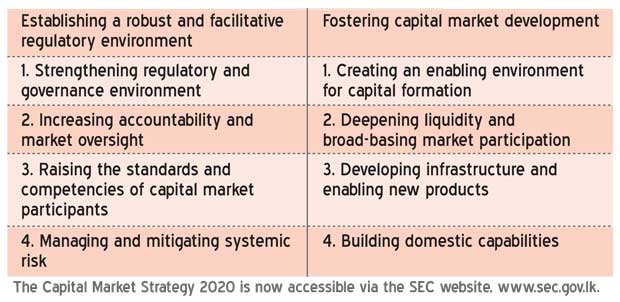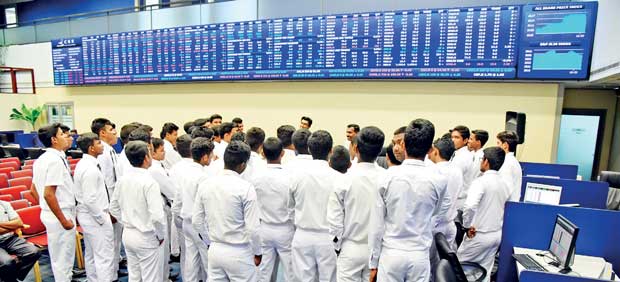DM: SEC releases Capital Market Strategy 2020
The Securities and Exchange Commission of Sri Lanka (SEC) has released the ‘Capital Market Strategy 2020’, a comprehensive transformative plan for Sri Lanka’s capital market, with the intention of providing strategic clarity to market participants and the public.
The significance of ensuring the capital market’s resilience has become more apparent during the recent years of sustained global economic and market uncertainty, divergent growth, volatility and other emergent challenges. In this context, the Capital Market Strategy 2020 reflects the SEC’s definitive force of continuity in engendering competitiveness and effective regulation in our capital market.
Focused capital market development initiatives have historically accelerated economic growth and contributed to financial sector stability in emerging economies. Such initiatives proved critical to economic growth amongst regional signifiers including Vietnam, Thailand, Malaysia, Korea, India and China and those outside the region including South Africa, Poland, Morocco, Hungary and Brazil.
In Sri Lanka, capital market development as measured by market capitalisation as a percentage of gross domestic product is 25.3 percent. In contrast, from amongst the above contenders, South Africa and closer to home, Malaysia and India, reflect ratios of 234.0 percent, 129.3 percent and 72.4 percent, respectively.
The overview of the Capital Market Strategy 2020 (Table 1) charts its core themes of establishing a robust and facilitative regulatory environment and fostering capital market development.
In shaping the Capital Market Strategy 2020, we are influenced by the need for regulatory strength and readiness and our ability to effectively deliver governance, enforcement and compliance. The current realities of capital markets necessitate an increasingly more proactive and responsive regulatory action. Further, due to the interconnectedness of markets and global nature, regulation assumes a more pervasive scope and requires progressive benchmarking against international
best practice.
The developmental objectives focus on the several constraints characterising our market – its small size and scarcity of liquidity, limited diversification in product offering from an investor’s perspective and in listing platforms from an issuer’s. Additionally, we consider the efficiency and commercial orientation of market institutions, market infrastructure and technology gaps and community capacity building extending to both the institution and industry.

Establishing a robust and facilitative regulatory environment
Strengthening regulatory and governance environment
The amendment of the SEC Act is among the key initiatives geared towards strengthening the domestic regulatory and governance environment. The enhancement of the SEC regulatory framework and capabilities includes the strengthening of the governance standards of the SEC, providing for the establishment of a clearing house acting as a central counterparty (CCP), regulating demutualised exchanges, recognising new categories of market intermediaries, introducing a wide range of enforcement tools to deal with market misconduct, enhancing the accountability of all capital market participants and encouraging early reporting to the SEC on possible market malpractice through provisions for whistleblower protection.
The passage of this Act would be pivotal to a series of incremental steps, beginning with Sri Lanka’s adherence to minimum international standards in capital market regulation and extending to an alignment of the domestic regulatory framework with international benchmarks. The SEC considers an enabling regulatory environment as being of foundational importance in creating a level playing field that instils trust and confidence among the varied market participants.
In 2016, the SEC extended an invitation to the International Organisation of Securities Commissions (IOSCO), the global standard-setter for securities market regulation, to conduct a Country Review of Sri Lanka. This was done with a view to assessing the present capital market regulatory framework, identifying the gaps in compliance with 37 Principles of Securities Regulation and developing a roadmap for enhanced compliance.
The Country Review was preceded by a detailed self-assessment to facilitate timely completion within the first quarter of 2017 and would result in comprehensive reforms following the publication of its findings. Such reforms would include reviews of rules applicable to the capital market as well as measures to enhance investor protection, improve fairness and market efficiency, reduce systemic risk and global regulatory arbitrage, reduce the costs of conducting business across borders and improve domestic regulatory capability.
It is widely anticipated that such reforms would lay a solid foundation for the Sri Lankan capital market and improve its ability to garner the interest of domestic and foreign institutional portfolio investors.
Rules applicable to all regulatees of the SEC are currently undergoing review and revision with a view to creating a more robust regulatory environment for all and instilling greater discipline market-wide.
Further, the domestic Corporate Governance Code applicable to listed companies is scheduled to be aligned with principles published by the Organisation for Economic Cooperation and Development (OECD), the international reference point for corporate governance regulation and implementation; thus improving the business integrity of listed companies.
Going forward, listed companies would also be encouraged to adopt integrated reporting, a framework that provides a holistic view of the corporate value creation process.
Increasing accountability and market oversight
The SEC places significance on the procurement of a technologically advanced system for market surveillance and regulatory reporting to ensure that transactions are carried out in compliance with the rules governing capital market activity. Such a system would enable the SEC to detect and deter potential market abuse and enhance its ability to pre-empt the occurrence of disruptions in the market as a result of irregular trading activity.
It is also proposed to cast duties on supplementary service providers including those hitherto unregulated by the SEC. This is to ensure that such persons remain accountable for the scope and quality of work performed in relation to the capital market. The SEC also hopes to extend its regulatory reach to encompass other hitherto-unregulated entities and instruments.
Raising standards and competencies of capital market participants
The Capital Market Strategy 2020 proposes to enhance and maintain high levels of professionalism among persons engaged in capital market activity by enhancing the guidelines on fitness and propriety applicable to market institutions and market intermediaries. At the same time, it is envisaged that the qualification framework of the SEC would undergo extensive revision, allowing for multi-tier licensing and continuous professional development
These new guidelines would drive a positive industry culture encouraging honesty and integrity among the regulatees of the SEC so as to better protect the investing public.
Mitigating and managing systemic risk
In order to better evaluate and address systemic risk, the SEC intends to adopt a risk-weighted capital adequacy framework for capital market institutions and intermediaries. This initiative is now underway, following the recent issue of Directives by the SEC stipulating risk-based capital adequacy requirements and the minimum shareholders’ funds requirement applicable to stock brokers. The development of a risk-based assessment framework for on-site supervision by the SEC would follow. Once such a framework is developed, the SEC would conduct inspections of its regulatees in relation to their relative risk profiles and systemic importance.
Prevailing post-trade risks including asset commitment risk and counterparty risk would be effectively addressed and financial stability improved upon, through the phased implementation of a CCP. The SEC directs the course of the sequential approach, prioritising the implementation of Delivery vs. Payment for settlement and the adoption of value at risk-based margining (VaR) to mitigate post-trade risk. Extensive consultation with specialists and the industry has led to the determination of both the margining and settlement framework in detail. The SEC would be creating an enabling legal framework in line with acceptable international benchmarks to enable post-trade risk management and related initiatives including the introduction of securities borrowing and lending.
Fostering capital market development
Creating an enabling environment for capital formation
The SEC envisions a vibrant capital market attracting strong issuer participation from both the private sector and state-owned enterprises (SOEs) as a preferred source of long-term fundraising. Representations have been made to the Government of Sri Lanka in exploring the potentiality of invigorating the capital market through the listing of SOEs with compelling investment propositions. Entry by SOEs into the capital market engenders less dependence on state financing whilst enhancing governance standards. The CSE is encouraged to engage with private sector corporates in order to facilitate their efforts to tap the capital market to fulfil the funding requirements.
The implementation of new listing platforms for issuers of varied size, scale, maturity and value-recognition needs is underway collaboratively with the CSE. The Multi Currency Board would enable local and foreign issuers to explore multicurrency listings, whilst small and medium enterprises (SMEs) would be provided access via the SME Board. The SEC along with the CSE is also keen to improve the efficiency and cost-effectiveness of the equity fundraising process through both operational and technological enhancements.
Creating a robust bond market is a significant component of the Capital Market Strategy 2020. The SEC-led collaborative representations in recent years secured tax concessions supporting bond market issuances. As a result, inflows to the primary debt market reached an all-time high in 2015, with Rs.83.4 billion being raised through debt IPOs.
Other strategies related to the debt capital market also include the streamlining of the bond IPO process, infrastructural enhancements to support enhanced secondary market activity and stewardship of joint stakeholder engagements to facilitate liquidity. Collectively, the initiatives aim to enhance the competitiveness of the debt market as a source of financing in a market which traditionally relies on equity.
Deepening liquidity and broad-basing market participation
The Capital Market Strategy 2020 aims to establish the capital market as a preferred investment choice by a broad range of investors. As an important conduit and enabler of retail investment, unit trusts are pivotal to this strategy. The SEC works towards supporting the unit trust industry by cultivating a conducive environment and creating awareness among the public in order to ensure that a wider segment of society can reap the medium to long-term benefits and rewards of investing in the capital market through unit trust investments.
The SEC seeks to actively engage provident funds and pension funds in diversifying their portfolios and increasing asset allocation to capital market investments. Increased participation by such long-term institutional investors can improve market stability and sustainability, as a result of their holding power and ability to act in a counter-cyclical manner. Traditionally having significant exposure to government securities, these funds could optimise portfolio returns and extend maturity profiles to provide better asset-liability matching through calculated investment in the market.
At present, with the broad-basing of market participation in mind, minimum public holding thresholds apply to listed companies upon initial listing and enforced thereafter on a continuous basis. The SEC would drive requisite policy formulation for the introduction of short-selling, securities borrowing and lending and other new products in order to deepen liquidity.
Developing infrastructure and enabling new products
Technological readiness, responsiveness and stability are material strategic considerations for market institutions and market participants. Headway has been made in this regard with the SEC driving the implementation of a common stockbroker back office and customised order management systems in conjunction with the CSE. Resulting in operational efficiency and streamlining of the trade-through-settlement value chain, the initiative sets the infrastructural foundation for the proposed phased implementation of a CCP. The implementation process constitutes modification of and additions to systems and processes industry-wide, particularly by redefining the CSE’s market infrastructure at world-class level.
To increase the portfolio choice of investors, the SEC is developing a sequencing framework for the introduction of new products ranging from Real Estate Investment Trusts (REITs) and Exchange Traded Funds (ETFs) to Financial Derivatives. The SEC would enable the introduction of a multi-asset offering for investors by spearheading policy formulation in order to facilitate related rule making by the CSE.
Building domestic capabilities
The SEC will facilitate comprehensive community capacity building. Institutional competencies of the SEC are to be enhanced through measures to recruit and retain a proficient workforce. Industry capacity-building focuses on enhancing the financial literacy and capital market expertise of all stakeholders in relation to the capital market and continuous investor education and public awareness-raising to equip investors with the knowledge required to make informed investment decisions.
The proposed demutualisation of the CSE is a central initiative of building domestic capability through the reorientation of the CSE to pursue strategic and commercial interests. Demutualisation segregates ownership and management of the CSE in order to adequately represent the interests of all capital market stakeholders. The CSE’s business model would be reviewed in the process to optimise financial sustainability. Institutional competence and global acceptability of the CSE is expected to be enhanced through demutualisation, the modality of which is currently being finalised.
Looking forward
Over the medium to long term, far-reaching reforms proposed as part of the Capital Market Strategy 2020 would support the proposition to Morgan Stanley Capital International (MSCI) to reclassify Sri Lanka as an emerging market, providing for broader visibility as an attractive portfolio investment destination.
Implementation
The expansive scope of the Capital Market Strategy 2020 necessitates prioritisation, with goals ranging from immediate to medium and long term. With the intent of increasing transparency, significant milestones would be communicated to the public over the implementation horizon.
Broad market and public consultation outreach would be in effect during the implementation. Public consultations were conducted in January 2017 in view of the proposed SEC Act and the proposed Guidelines on Fitness and Propriety for Stockbrokers, while an industry consultation on the proposed Advertising Guidelines for Unit Trusts was conducted in November 2016. Further consultation can be expected as other development initiatives progress.
We recognise that in order to implement the initiatives under consideration, the SEC would need to align multiple stakeholders with divergent interests towards universal goals. While the auspices of the Government of Sri Lanka has been secured for the Capital Market Strategy 2020, its successful implementation also anticipates collaborative and complementary alliances with regulators, supranational organisations, market institutions, market participants and industry associations.
The SEC, in redefining the competitive position of the market, is committed to aligning its role as a responsive market regulator with the significant opportunities present before it.
Source: Daily Mirror
Image Courtesy: Daily Mirror




